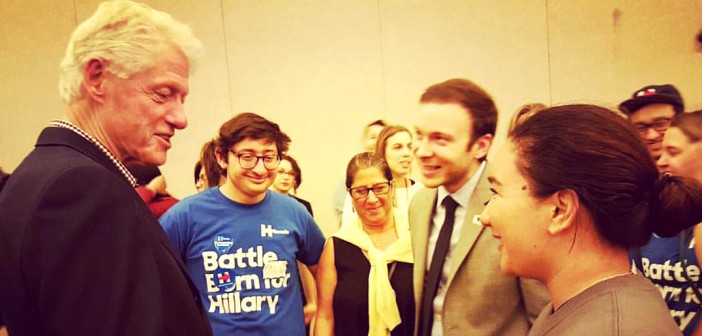Lehigh is not known as a politically active school. Saladin Ambar, a political science professor, said Lehigh’s academic emphasis on the hard sciences and business can have a somewhat deleterious effect on student activism.
“Part of what draws students into political participation is a background where something is wrong,” Ambar said. “If you come from a background where everything is OK, you might be focused on career choices as opposed to what you can do to affect the system towards change.”
Emily Hu, ’15, graduated from Lehigh with a degree in global studies. She was hired to work on Hillary Clinton’s 2016 presidential campaign. Hu has traveled across the country with the campaign throughout the presidential primary season.
Ambar said a classroom setting will not totally prepare students to work in a political campaign, regardless. He said students in political science courses work at a theoretical level, but active engagement in politics is far from theoretical.
Barrett Miller, ’16, the leader of Lehigh’s College Republicans, said Lehigh has allowed him to develop some other skills, such as public speaking, that would help him in politics later on. Though Miller has not taken classes in political science, he is a behavioral neuroscience major.
“It’s sort of a half joke that’s been running around that they want me to run for president in 2032, but whether or not I’ll actually do that, I don’t know,” Miller said.
Ken Brill, ’17, leader of the College Democrats, felt similarly about Lehigh students’ lack of preparation for political engagement.
“We gain general skills that would allow us to succeed in a political career,” Brill said. “We learn how to formulate ideas and take new information into account. As far as specifics, fewer people here are really well versed in the political systems from a class or from being involved directly.”
Nathan Keim, ’17, said although politics aren’t discussed much on campus, he doesn’t personally feel the need for more in-person political engagement. Though Keim is conservative, he sometimes goes to College Democrats meetings to challenge his views.
Keim’s recreational interest in politics has led him to develop strong views, but he mentioned concern that the political climate on campus might complicate this for less politically informed students.
“I’m just concerned that if you’re not used to debating the issues and if you only pay attention in election years, you might be making decisions based on if a candidate sounds good,” Keim said, “instead of if they’re agreeing with an opinion that you’ve had a lot of time to develop.”
Ambar said the educational focus on career preparation is relevant across the nation, and seeing education as serving a practical end is a positive thing. He also stressed, however, the need for education that inspires students to do more than just get a good job.
“We wouldn’t want Martin Luther King Jr. to be just another great lawyer,” Ambar said.
Ambar said by focusing on graduating a student body that is not just looking for a good job but sees itself engaged in the world politically, Lehigh could do better to foster an environment where students confront things they see as unjust. He emphasized admissions is going a good job but must constantly strive to recruit and admit as diverse a pool of applicants as possible.
Ambar said studying liberal arts in addition to the hard sciences and business will produce more well-rounded individuals upon graduation, as well.
“Engineers should know how to grasp history, to know the world well that they’re reshaping, physically,” Ambar said.
Barrett mentioned another way to make students more politically inclined would be to foster relevant political discussions in courses of all disciplines at Lehigh. While Barrett is grateful his professors don’t bring up strong political opinions in their lectures where there is no room for discussion, he thinks political discussions in interactive classes could be beneficial.
“If a professor says something you don’t agree with, you might be more motivated to speak up or educate yourself more so that you can have an intelligent argument with them,” Barrett said.
Because politics play a role in every field, Barrett suggested Lehigh could consider incorporating a class into each department that focuses on how that discipline interacts with politics. By getting students to think about the direct role that politics will play in their future, Lehigh could foster a climate where students are more likely to be politically engaged.






Comment policy
Comments posted to The Brown and White website are reviewed by a moderator before being approved. Incendiary speech or harassing language, including comments targeted at individuals, may be deemed unacceptable and not published. Spam and other soliciting will also be declined.
The Brown and White also reserves the right to not publish entirely anonymous comments.